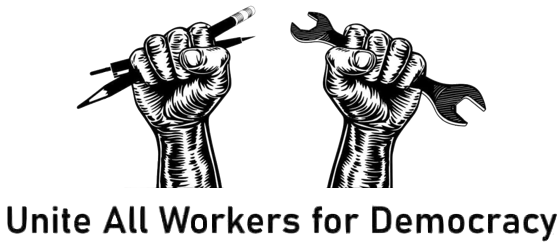Aggressive organizing
in electric vehicles
& foreign-owned plants
UAWD Priority resolution for
the UAW Constitutional Convention
Agressive Organizing in Electric Vehicles & Foreign-Owned Plants
Resolution
We must recognize the scale of the threat to our union posed by a non-unionized electric vehicle (EV) sector & traditional automotive sector. We call for making new organizing an aggressive & well-resourced priority of the UAW. Reflecting on the causes of past failed organizing drives in auto, we also call for a more effective worker-led approach to new organizing drives.
Background
- The Intergovernmental Panel on Climate Change warns that carbon intensity of the transportation sector needs to decrease by 50% or more by 2050 to avert catastrophe.
- Globally, plug-in passenger EV sales are expected to rise from 6.6 million in 2021 to 20.6 million in 2025. By 2025, plug-in EVs will represent 23% of new passenger vehicle sales globally, up from just under 10% in 2021.
- Electric vehicles take less labor to produce than internal combustion engine (ICE) vehicles, a technological change that our employers will use to undermine our power.
- In addition, almost 100% of foreign-owned plants, which make up almost 50% of the U.S. auto industry, are not unionized.
- The failure to organize the EV sector will also adversely impact bargaining in the already unionized ICE sector. Our power to maintain & improve contracts depends on strong union density throughout the entire auto sector.
Opposition from the Administration Caucus
- While the UAW has released a white paper documenting the massive disruption the EV transition will bring to the auto industry, it has failed to produce an aggressive organizing strategy to meet the scale of the challenge.
- The UAW has also undertaken numerous unsuccessful organizing drives at foreign-owned plants since the 1980s. We need to learn from past mistakes by adopting new organizing strategies, this time led by rank-and-file organizers.
- However, the AC continues to make top-down organizing decisions, which don’t take into account or respond to rank-and-file perspectives.
- As an example, the UAW has not committed to unionizing Ford’s $7 billion venture with a South Korean battery maker to build a “mega campus” in Stanton, Tennessee.
Why Organizing Matters to Our Union Democracy
- The EV and ICE workforce must be deeply organized so we can fight together for a just transition for auto workers—so that as ICE jobs decrease, workers transition to producing EVs & public transit. Or, if overall production slows, workers are paid the same under the same conditions for less work.
- A unionized EV & ICE workforce can make demands to protect workers around the world, as supply chains needed to make batteries, especially the mining of lithium, will be scaled up immensely.
- Outside of the Big 3, the UAW should begin an aggressive organizing campaign at U.S. facilities in both ICE & EV sectors, including Tesla, Toyota, Nissan, Volkswagen, & other non-union automakers & parts manufacturers.
- The AC’s top-down organizing strategy has not worked, and the AC’s corruption has impeded new organizing. Instead, the UAW should launch Local EV Organizing Committees to allow for rank-and-file-led organizing campaigns to develop. A national EV Organizing Committee could oversee the deployment of resources, but it should be done with direct input from local organizers.
The UAW needs a three-pronged strategy:
- Organizing internally, especially in right-to-work states, to build up membership and militancy in existing auto locals in order to be able to place significant enough pressure on the Big 3 that the master contract be as expansive as possible.
- Organizing at all Big 3 joint venture programs and facilities to organize any unorganized workers and establish new locals or merge units of workers into existing locals.
- Organizing externally across the entire ICE & EV sectors outside of the Big 3, including in battery production, charging infrastructure, mass transit vehicle production, & any other related parts or infrastructure manufacturing, as well as at any foreign-owned plants.
Why Organizing matters to us
- As auto workers & manufacturing workers, we need a just transition to fight for our jobs in a new economy.
- As legal services & academic workers, taking action on climate change could not be more urgent—& we can fight for jobs while we do it.

2022 Convention
Unite All Workers for Democracy (UAWD) is a grassroots movement of UAW members united in the common goal of creating a more democratic and accountable union.
Follow what we're fighting for at the 2022 UAW Constitutional Convention.
Get updates
Free online classes and news for UAW members
CONTACT US
uawdemocracy@gmail.com

